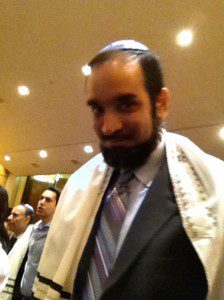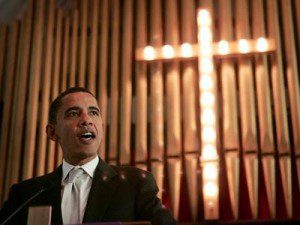
Note: I continue to fill in for Aziz Poonawalla on this site for the next couple of weeks. For those who are interested, these posts will also be available on my own blog Notes from The Heartas well.
Recently, I had the opportunity to attend a bar mitzvah ceremony at a conservative temple here in Los Angeles. I am well known to many in the congregation due to my profession and I was greeted with warmth and acceptance, despite my Muslim faith. Although this was not my first temple service, it was the first I attended that fell on Shabbat. As such, it was the first time I participated in the full religious ritual. The result was a transformative experience in many ways.
The similarities were eerie, almost like practicing Islam in another dimension. The sermon was basically about a favorite Muslim topic–tawhid (but as it related to Moses and Aaron, a different subject for a different time). The head coverings, the segregation of men and women (though not as strict), and the bowing during prayer all evoked images of Muslim services. Since we share a common heritage, it will come as no surprise to those versed in history or theology that our services have so much in common.
At first, one thing I found a little surprising was the emphasis on holocaust remembrance. While I am reasonably familiar with the inhuman atrocities committed during the holocaust, I was initially taken aback by the emphasis placed on the holocaust during the services. After all, my thoughts went, this happened seventy years ago in a far away land, and most of the younger people in the room had never actually met a victim. Did they really need to perseverate on it so much?
Three words from my wife caused perspective to crash down upon me, however, as she whispered to me “It’s their Karbala”.
Karbala, of course, refers to the infamous massacre at Karbala, Iraq perpetrated 1400 years ago on Husain ibn Ali, grandson of the Prophet Mohammed (SA). It is commemorated regularly to this day by Shi’as (such as myself), especially during the Islamic month of Muharram. It is mentioned at almost every Shi’a service, and often evokes almost uncontrollable expressions of grief, even today.
The power of grief to unite and galvanize a community is second to none. The massacre of Karbala and the holocaust share this trait in common. Both are grotesque acts of violence, willfully perpetrated on innocents. Both of these events are used to unite, and indeed define, their respective communities. Most historians consider the massacre at Karbala to be the coalescent moment of the Shia movement, which had actually begun a generation earlier. Similarly, while the modern Zionist movement was in existence long before World War II, the holocaust served to coalesce the movement into a definable and concrete entity. Even the events of 9/11 can be understood in a similar fashion, as they served to unite the country like very few times in our history. Unfortunately, along with the patriotism, they also awoke the xenophobia which long lived under the surface of the American psyche.
Grief is the ultimate expression of love. Without love, there can be no grief. And thus expressions of grief help us to realize the love we harbor inside ourselves. The grief that we feel serves a true barometer of our internal value for the lost, a barometer immune even from self-delusion. In this way, grief serves as a true reflection of our soul. To grieve with someone is thus to share a special bond with them, a bond between the souls. In this way, shared grief can unite a community like no other single experience.
The holocaust is a trauma on the Jewish experience which will never, and should never, heal. Much like the effect of Karbala on the Shi’as, the holocaust unites the Jewish people, and even defines them in a very real sense. Thus, it will very likely be remembered and commemorated 1400 years hence, much as Karbala is today. The critical observer will find many differences between these events, however. They would be correct in doing so. But I would endeavour to focus on the similarities instead, as collective grief is one of the common bonds of humanity which unite us. With my wife’s simple but profound sentence at that moment, I was privileged to share in that grief; and at least for a moment I became one with my Abrahamic brothers.

